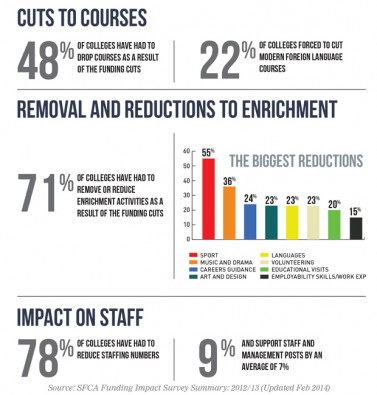Vocational education seems to be viewed as a soft option for public funding cuts, but it’s a view that has far-reaching consequences for the economy, says Kirstie Donnelly.
There’s a theme emerging around a lot of the policy changes in the FE sector of late — cuts.
First, there was the announcement of a 17.5 per cent funding rate cut for 18-year-olds, described by Education Secretary Michael Gove as the ‘least detrimental’ scenario. But for who? Certainly not young adults, who see vocational qualifications as a way of getting on the skills and employment ladder.
Then, the Skills Funding Agency (SFA) announced plans to cut funding for almost 1,500 qualifications that fall below the 15-credit threshold.
We weren’t all aware the threshold had increased from 12 to 15 credits, but for the most part we were prepared for something — we just didn’t know the full extent of it, or how it might impact on all would-be vocational learners.
While there is logic in de-cluttering the system — something we welcomed from the Whitehead review — this goes too far.
It looks like random cuts are being made to compensate for a funding hole elsewhere, and sadly the adult vocational market is not seen as a priority, but rather an easy target.
This latest announcement is cutting funding for the sake of it without considering the wider, longer-term impact of the changes.
We know youth unemployment remains high, stubbornly so.
Don’t just cut back and ‘cleanse the system’ without considering all the evidence and all the facts. Don’t make any more snap decisions
We also know that employers are facing skills gaps in certain industries, which could destabilise the UK’s economic recovery.
And yet we’ve surely all seen research detailing employers’ fears that young people aren’t prepared for the workplace.
To me, vocational qualifications are the solution. They give people the chance to develop the skills and confidence they need for the workplace.
They enable future progression or specialism within an industry. Ultimately, they bridge the gap between education and employment.
The government needs to think carefully about any further changes it makes to the system — particularly when it comes to funding cuts.
First and foremost, employers and their needs must be the focus of any changes and developments. After all, they’re the ones who hire people in the first place. But I doubt they have been consulted.
Some of the qualifications that will cease to receive funding on the back of the SFA announcement may indeed have less value to employers.
But equally, we can’t assume that just because a qualification is niche to a certain industry, or has limited take-up, that it is worthless. In fact it could be the complete opposite.
We also need to consider how different sectors operate. Some require more specific or atomised learning. This blanket approach cannot work for all industries.
Employers aside, we mustn’t forget the impact on the learners themselves, particularly adult learners or the long-term unemployed. Or even the likes of ex-service personnel or those leaving prison.
Many won’t have the skills or confidence to jump straight into a long-term programme of study. Shorter courses can help them to learn the ropes and act as a stepping-stone onto further learning.
And what about those already in work who want to enhance their skills further? Does
the government realise it could be denying them the opportunity to further their careers? This surely this goes against everything vocational education and training stands for.
I urge the government, the SFA and others to proceed with caution. Don’t just cut back and ‘cleanse the system’ without considering all the evidence and all the facts. Don’t make any more snap decisions. Think about the future impact this will have on the economy. Think about the individuals this will affect.
Vocational pathways can and do deliver quality results. It’s about time this country recognises that, instead of treating them as the poor relation that can be cast aside whenever the purse strings are tightened.
Kirstie Donnelly, UK managing director,
City & Guilds


